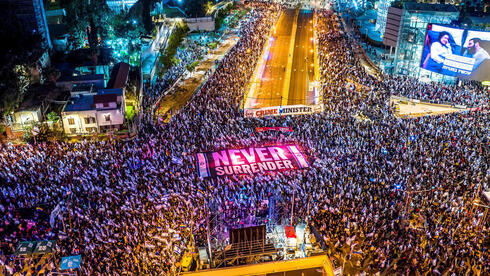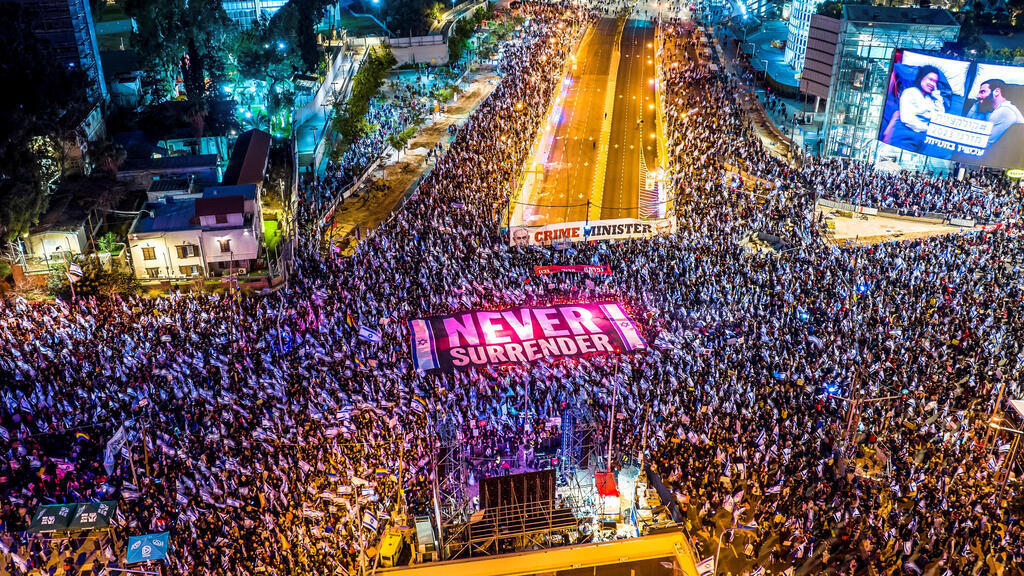
Opinion
Moscow on the Yarkon: Fighting for Israel's future
As a teenage immigrant to Israel who grew up in a non-democratic regime in Russia, Calcalist's Sophie Shulman knows Israel may not be perfect, but it is home and she will fight for it
Every relationship, even the best, has breaking points. I had a few of these with the State of Israel, which I immigrated to at the age of 14, but I always moved on, because I was head over heels in love with this country. The freedom to walk outside without fear even at night, the state's sanctification of the value of life for every Israeli, the smell of orange blossoms, the people who are always willing to help - and also ice cream in endless flavors, bananas and tomatoes all year round at the supermarket, without standing in line and a million other more or less banal things that make up the miracle of Israel. So what if there was a bit of racism and they whistled at me in the street and shouted all kinds of words that I didn't really know. It was a small crack, surprising, but I moved on. But it was no more than a handful of people, who came across someone foreign and unknown who came from Russia.
The second crack was deeper and more significant, when I had to prove to a group of rabbis that I was Jewish for all intents and purposes, so that they would grant me a kosher certificate that I was Jewish. A certificate that would allow me to marry my Israeli husband, who of course was not required to go through such a procedure. It didn't matter to anyone that most of my family perished in the Holocaust, that my grandfathers and grandmothers were called Sarah, Nechama, David and Nathan. Nor that my mother's name before marriage was Weizmann, nor that in Russia I was always the Jew with the different appearance and the strange last name. As far as the religious establishment was concerned, I was suspect - until I managed after quite a few humiliations to prove my racial purity, on the way to the desired marriage certificate. This left a scar and a degree of suspicion towards the religious establishment, but I dismissed it by saying that it was a small handful of fanatics that I would not have to encounter again. Maybe only after my death, but then I won't really care anymore.
The third rift is happening now, and it's already too big. It is of a completely different level, because it is no longer a small group nor a passing phenomenon. The wave comes from above, from the establishment, and sinks all the foundations on which life in Israel was built.
Hundreds of thousands of protesters take to the streets every week, but only some of them, those who came from outside, have a clear picture in their head of what life looks like "after" - on the other side of democracy. The tears that this picture causes, as Knesset member Yulia Malinovski from the Israel Beiteinu party was unable to hide, come from the deepest place. It is the realization that everything you ran away from, everything you managed to build despite the broken things along the way, everything you loved and enjoyed so much in your home in the State of Israel, may be erased.
The statement that only an outsider can understand what is now at stake may sound condescending, but it is the opposite. This comes from the lowest place of someone who was a minority, of someone who personally experienced a different life in a non-democratic country. In this life, the state is against you, and you have no tools to face it. Even though I lived only 14 years under such a regime, and even though those were happy years, because childhood is innocent and happy at its core, I absorbed the lack of freedom and trust in the system very well.
It is also what remains in the intangible memory, as the tangible memories of sights and smells and tastes fade away. When you don't have ten types of yellow cheese or yogurt in the supermarket, it doesn't bother you simply because you don't know anything else. But the feeling of impermanence and helplessness as a citizen in a country where there are practically no courts is something that you absorb in your skin. Even if you heard about it mainly in living room conversations, it becomes an inseparable part of you, and your anxieties.
But despite everything, I don't want to break up this relationship. Those who have lived as Jews in a country other than Israel know that home is better, with all its flaws. And those who were born here and were partners in the creation of this miracle surely know. The good 30 years I lived in a free country taught me not to bow my head. You must not make excuses for yourself, say that this is how it is in life and maybe one day it will get better. The previous 14 years, in a country where freedom was impossible, taught me that now is the time to fight. Any legal struggle, no matter how fierce, that is waged while the country is still democratic, is better than the alternative, which is still soaked in my skin.















